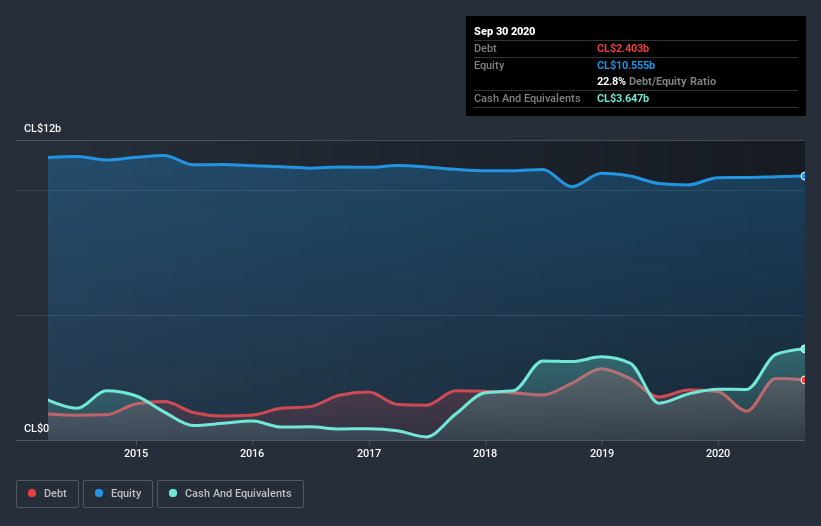Health Check: How Prudently Does Nibsa (SNSE:NIBSA) Use Debt?
Warren Buffett famously said, 'Volatility is far from synonymous with risk.' So it seems the smart money knows that debt - which is usually involved in bankruptcies - is a very important factor, when you assess how risky a company is. We can see that Nibsa S.A. (SNSE:NIBSA) does use debt in its business. But the real question is whether this debt is making the company risky.
When Is Debt Dangerous?
Debt is a tool to help businesses grow, but if a business is incapable of paying off its lenders, then it exists at their mercy. If things get really bad, the lenders can take control of the business. However, a more usual (but still expensive) situation is where a company must dilute shareholders at a cheap share price simply to get debt under control. Of course, debt can be an important tool in businesses, particularly capital heavy businesses. When we think about a company's use of debt, we first look at cash and debt together.
Check out our latest analysis for Nibsa
How Much Debt Does Nibsa Carry?
The image below, which you can click on for greater detail, shows that at September 2020 Nibsa had debt of CL$2.40b, up from CL$2.00b in one year. However, its balance sheet shows it holds CL$3.65b in cash, so it actually has CL$1.24b net cash.

A Look At Nibsa's Liabilities
We can see from the most recent balance sheet that Nibsa had liabilities of CL$1.50b falling due within a year, and liabilities of CL$3.15b due beyond that. Offsetting this, it had CL$3.65b in cash and CL$1.10b in receivables that were due within 12 months. So it can boast CL$93.6m more liquid assets than total liabilities.
Having regard to Nibsa's size, it seems that its liquid assets are well balanced with its total liabilities. So it's very unlikely that the CL$6.23b company is short on cash, but still worth keeping an eye on the balance sheet. Simply put, the fact that Nibsa has more cash than debt is arguably a good indication that it can manage its debt safely. The balance sheet is clearly the area to focus on when you are analysing debt. But you can't view debt in total isolation; since Nibsa will need earnings to service that debt. So when considering debt, it's definitely worth looking at the earnings trend. Click here for an interactive snapshot.
In the last year Nibsa had a loss before interest and tax, and actually shrunk its revenue by 12%, to CL$6.7b. That's not what we would hope to see.
So How Risky Is Nibsa?
Although Nibsa had an earnings before interest and tax (EBIT) loss over the last twelve months, it made a statutory profit of CL$423m. So when you consider it has net cash, along with the statutory profit, the stock probably isn't as risky as it might seem, at least in the short term. With mediocre revenue growth in the last year, we're don't find the investment opportunity particularly compelling. When analysing debt levels, the balance sheet is the obvious place to start. However, not all investment risk resides within the balance sheet - far from it. These risks can be hard to spot. Every company has them, and we've spotted 2 warning signs for Nibsa (of which 1 is potentially serious!) you should know about.
If you're interested in investing in businesses that can grow profits without the burden of debt, then check out this free list of growing businesses that have net cash on the balance sheet.
If you’re looking to trade Nibsa, open an account with the lowest-cost* platform trusted by professionals, Interactive Brokers. Their clients from over 200 countries and territories trade stocks, options, futures, forex, bonds and funds worldwide from a single integrated account. Promoted
Valuation is complex, but we're here to simplify it.
Discover if Nibsa might be undervalued or overvalued with our detailed analysis, featuring fair value estimates, potential risks, dividends, insider trades, and its financial condition.
Access Free AnalysisThis article by Simply Wall St is general in nature. It does not constitute a recommendation to buy or sell any stock, and does not take account of your objectives, or your financial situation. We aim to bring you long-term focused analysis driven by fundamental data. Note that our analysis may not factor in the latest price-sensitive company announcements or qualitative material. Simply Wall St has no position in any stocks mentioned.
*Interactive Brokers Rated Lowest Cost Broker by StockBrokers.com Annual Online Review 2020
Have feedback on this article? Concerned about the content? Get in touch with us directly. Alternatively, email editorial-team (at) simplywallst.com.
About SNSE:NIBSA
Nibsa
Develops, manufactures, and sells plumbing, bathroom fitting, and other products and solutions in Chile.
Excellent balance sheet average dividend payer.
Market Insights
Community Narratives



